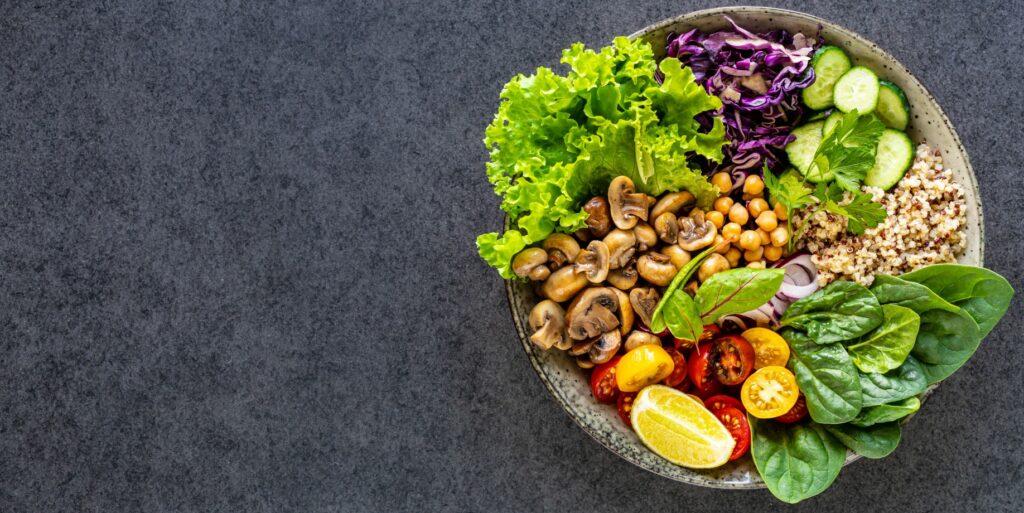People prefer a vegetarian diet because of various reasons. Vegetarian food is primarily plant-based. However, there are different types of vegetarianism. Vegetarian diets are healthier as people can save themselves from the hormones used in animal foods. Some people become vegetarian because of their religion, animal rights, and environmental concerns.
If you want to live on vegetarian food from now, you might be contemplating what kind of vegetarian diet you should opt for. This article will help you learn about the different types of vegetarian diets and the benefits associated with becoming vegetarian.
Different types of vegetarian diet
The different types of vegetarian diets are given below. Keep on reading to learn more about them.
1. Vegetarian
In general, vegetarian food does not consist of meat, poultry, and fish. However, there are certain types of vegetarian people who include some animal products in their diet.
Lacto-Ovo vegetarian- This kind of vegetarian food includes dairy products and eggs.
Lacto vegetarian- The Lacto vegetarian people consume dairy products but not eggs.
Ovo vegetarian- The people who are Ovo vegetarian consume eggs but not dairy products.
2. Vegan
The people who go vegan do not consume meat, eggs, fish, or dairy products. They also do not eat gelatin, honey, or any other animal products.
3. Partially vegetarian
Partially vegetarian people do not consume meat but eat some other animal products, including fish and meat.
Pescetarian- Pescetarian refers to those who eat fish.
Pollo-vegetarians- They consume poultry but avoid meat and fish.
4. Flexitarian
Other people who individuals deem as vegetarians follow a flexitarian or semi-vegetarian diet. The people who eat flexitarian food consume a plant-based diet primarily, but they consume meat, dairy, eggs, poultry, fish, and other seafood in small quantities on a few occasions.
Benefits of going vegetarian
There are various advantages associated with being vegetarian when we follow it correctly. Your vegetarian diet would not reap any results for your health if you only intake processed food, bread, pasta, and so on in large amounts, along with an excess of sugar and a minimal quantity of fruits and vegetables. However, if you do follow the diet correctly, you will experience the following benefits.
1. Good for your heart
According to research, people who consume vegetarian food are one-third less likely to get admitted to a hospital due to cardiovascular disease. For an individual who follows a vegetarian diet to reduce the chances of heart disease, they must consume high-fiber whole grain, legumes, nuts, vegetables and fruits, and other less glycemic food.
To boost your heart health, you must eat soluble fiber and increase the consumption of food that will keep your sugar levels in check. It will reduce your cholesterol.
2. Reduces the risk of cancer
The risk of cancer might not be highly less, but compared to nonvegetarians, vegetarians have a lower risk of developing cancer. According to studies, it has been discovered that living on vegetarian food lessens the risk of cancer in general.
Based on studies, it was found that certain types of vegetarian diets reduce the risk of certain types of cancer. For instance, a person who lives on a vegan diet reduces the chance of developing cancer the most compared to other diets. It also decreases the possibility of female-specific cancers. An individual who consumes Lacto-Ovo vegetarian food develops good defenses against cancers linked with the gastrointestinal tract.
3. Prevention of type 2 diabetes
A vegetarian diet can alleviate the symptoms of type 2 diabetes and prevent this disease’s risk in the future. Plant-based food with low glycemic content such as whole grains, legumes, and nuts help ward off the risk of type 2 diabetes. They keep the sugar level in control. Studies found that vegetarians have half the chances of being diagnosed with type 2 diabetes compared to nonvegetarians.
4. Lowers blood pressure
Researchers have discovered that people with no meat intake have lower blood pressure. It has been found that the vegan category of vegetarians has lower blood pressure than the meat-consuming category of vegetarians.
Plant-based food is a blessing as it has low amounts of sodium, fats, and cholesterol. A good portion of potassium is present in fruits and vegetables, and hence it helps lower blood pressure.
5. Decreases the symptoms of asthma
According to old Swedish studies, a vegetarian or a vegan diet contributes to decreasing asthma symptoms. The study involved 24 participants consuming a vegan diet. Twenty-two of these people noticed an improvement in the asthma symptoms and also showed reduced dependency on medications.
It is believed that the consumption of animal-based food triggers specific allergies. Hence, eliminating these foods from your diet can prevent these triggers and inflammatory responses.
6. Better bone health
It has been found that the number of people affected by osteoporosis is low in countries that primarily consume vegetarian food. Animal products can force calcium out of your body. The consequence is bone loss and osteoporosis.
Studies found that individuals who were Lacto Ovo vegetarians for 20 years had only 18 percent loss in bone minerals by the time they reached 80 years of age. In contrast, individuals who consumed nonvegetarian food had a 35 percent loss in bone minerals at the exact age.
7. Decreases depression
Based on certain studies, it is found that a vegetarian is more favorable than their meat-eating counterparts. According to reports, a vegan scored lower on depression tests and mood profiles while the non-vegetarians had higher scores of depression. Additionally, the component of freshness in fruits and vegetables makes the consumers happier and calmer.
Conclusion
There are specific risks that come with going vegetarian. The vegetarian diet might not fulfill certain types of vitamins and minerals such as Vitamin B-12 and omega-three fatty acids.
If you are vegetarian but consume many sodas, cakes, french fries, and other fast foods with little nutritional value, it will adversely affect your health. Foods rich in empty calories are harmful whether they are meat-free or not.





 Ways To Improve Your Health
Ways To Improve Your Health